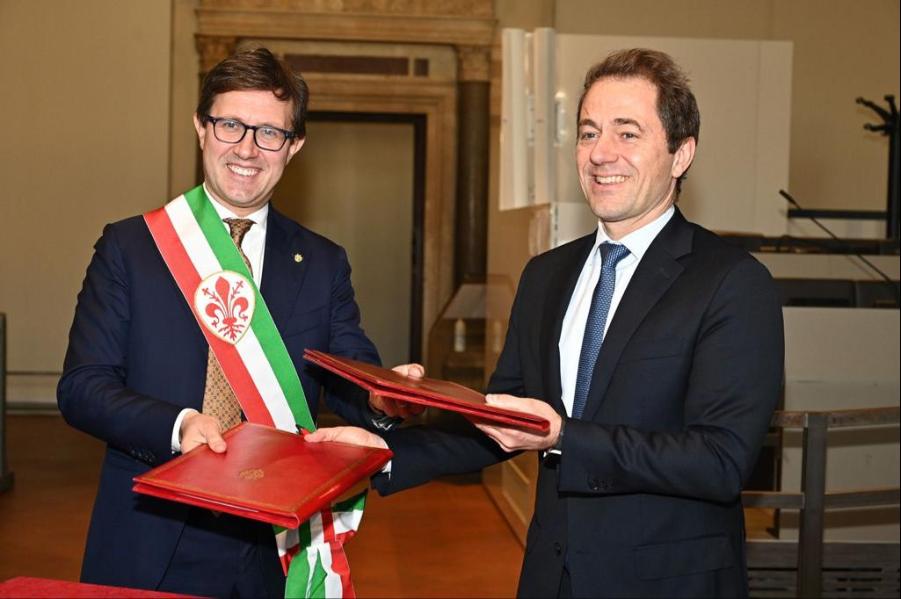
- The planned operations aim to improve the energy efficiency and security of public buildings, the rehabilitation of green areas, the construction of cycle lanes and the strengthening of the municipality's digital infrastructure.
- The best interest rate terms available on international markets mean that the resources provided by the EIB will enable the municipality of Florence to make substantial financial savings over the 25-year financing period.
- This operation brings the total amount of EIB concessional financing granted to the municipality of Florence to over €1 billion, the most of any Italian municipality.
- Italy is among the biggest beneficiaries of EIB financing for urban areas, having received more than €12 billion in the last five years.
The European Investment Bank (EIB) is providing a €200 million framework loan to support the municipality of Florence's 2022-2027 investment plan. The planned actions will contribute to urban regeneration, the redevelopment and energy efficiency of public buildings and the advancement of sustainable mobility. Since 1998, the EU bank has provided €1.06 billion to Florence across nine operations.
The agreement signed today and the approval of the operation by the municipal council and the EIB Board of Directors opens up financing possibilities for a wide range of other major investments for the city. These include the Smart City plan and climate strategies to improve the city's resilience to future climate events such as earthquakes and floods.
In concrete terms, the EIB funding will make a particular contribution to improving the energy efficiency of public buildings including schools and sports facilities, redeveloping green areas, public spaces and roads, and promoting sustainable mobility via the purchase of electric buses and the construction of cycle lanes and rest areas. The municipality’s digital infrastructure (such as its fibre optic network) will also be strengthened.
With this operation, the municipality of Florence will have received more EIB concessional financing than any other Italian municipality, enabling it to make major investments in regional development. The best interest rate terms available on international markets mean that the resources provided by the EU bank will enable the municipality of Florence to make significant financial savings. The municipality estimates that it will save over €10 million over the EIB loan's 25-year term.
“Big municipalities like Florence play a key role in promoting the climate transition in Italy. Investments in regenerating urban areas, promoting sustainable mobility and the energy efficiency of public buildings are priorities for the EIB, with a view to making Italy more sustainable and resilient to future climate events,” said EIB Vice-President Gelsomina Vigliotti. “Italy is among the biggest beneficiaries of EIB financing for urban areas, having received more than €12 billion in the last five years. This operation brings EU bank support for Florence to over €1 billion, meaning it has received more EIB investment than any other Italian municipality.”
Mayor of Florence Dario Nardella said: “Almost all EU-funded projects have environmental investments at their heart, and this is key for cities because pollution and climate change are increasingly affecting our residents. The agreement signed today will provide us with up to €200 million from the European Investment Bank, a public bank aiming to promote the climate transition and urban regeneration in order to protect the environment. This €200 million loan breaks a record: since 1998 we have received over €1 billion in investment, the first Italian city to do so and among the first in Europe when population is taken into account. It means that we are a reliable city for public banks like the EIB, and that we make use of the EU funds we receive. We have built new schools and redeveloped many public spaces and will continue to do so in the coming years with various major projects, some of which have already begun. These include the Sant’Ambrogio market, the Andrea del Sarto sports hall, the Don Milani school, earthquake-resistant improvements in local schools and many others, such as the completion of the “bicipolitana” cycle network. All of these projects will be carried out using this loan, whose low interest rate will save us money compared to the interest we would pay on traditional bank loans. This signature will enable Florence to continue investing in many sectors.”
The previous eight EIB loans granted to Florence have made a significant contribution to the rehabilitation and modernisation of public buildings such as schools, administrative buildings and cultural heritage, and of public spaces such as parks and other green areas. EIB-financed investments include the Florence tram network (particularly lines 1 and 2), the city kennel, the Dino Compagni school, the Santa Maria a Coverciano school complex, the new Piazza dell’Isolotto, Piazza del Carmine, and the Ponte a Greve park, as well as the redevelopment of Piazza Goldoni, Piazza Nannotti, Piazza Edison and Piazza Indipendenza.
Background information
The European Investment Bank (EIB) finances projects in four priority areas: infrastructure, innovation, climate and environment, and small and medium-sized enterprises (SMEs). Between 2019 and 2021, the EIB Group provided more than €36 billion in financing for projects in Italy.
EIB support for urban areas
In the last five years, the EIB has allocated over €96 billion in loans to urban areas in Europe, supporting more than 1 200 operations aiming to promote urban development, sustainable mobility, the environment, social inclusion and climate action. Italy is the second largest beneficiary of EIB investment for urban areas after France.